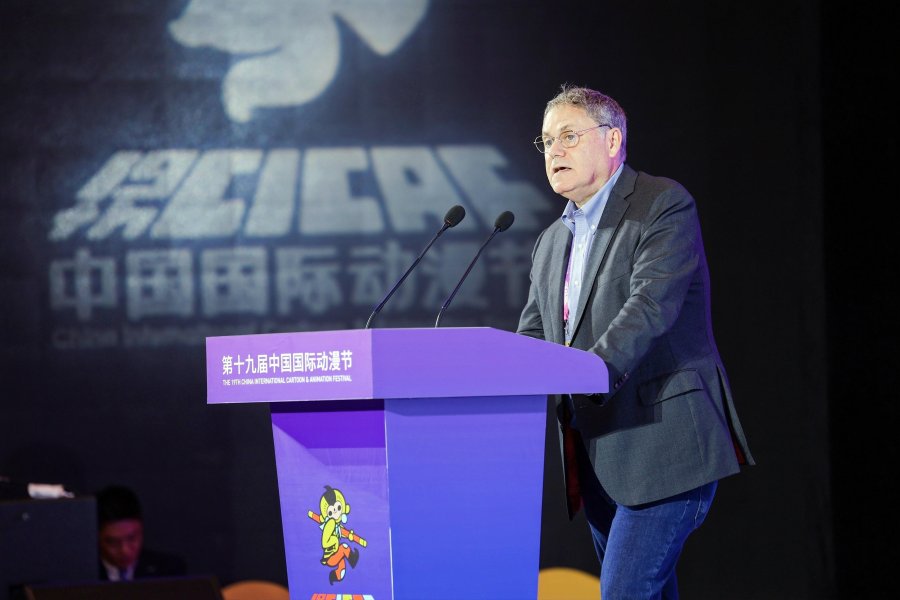July 14, 2023
BEIJING – Stepping into the exhibition section of the China International Cartoon and Animation Festival, one feels like being pulled into the pages of a comic book or, even, an animation film. You might bump into a beautiful woman wrapped in an ancient dress, a silver-haired “warrior”, or even someone dressed up like a giant frog.
The annual carnival that brings together cosplayers and anime fans recently concluded in Hangzhou, Zhejiang province, attracting a total of 10.8 million visits, including both in-person attendance and online participation.
The five-day festival, held from June 20 to 24, attracted more than 2,300 participants from 567 companies and institutions representing 67 countries and regions, and achieved fruitful outcomes with the inking of plan-to-cooperate contracts worth a total of 1.49 billion yuan ($204.8 million).
Over the past two decades or so, the festival has bestowed Hangzhou, a historical city renowned for its iconic West Lake, with the additional title of “the capital of cartoon and animation”. Statistics from the local media reports show that the annual production of animated series in Zhejiang province has increased significantly, from approximately 8,100 minutes in 2005, during the first edition of the festival, to over 31,200 minutes in 2022, a remarkable 285 percent surge.
Unraveling ‘secrets’
For most animators and industry insiders, the festival’s intense schedule, filled with master classes and forums, offers a glimpse into lesser-known facts behind some of the latest hits.
Earlier this year, Zhongguo Qitan (Yao-Chinese Folktales), an anthology animated series comprising eight stand-alone short stories, became a phenomenal hit, amassing 300 million clicks on the streaming site Bilibili and receiving a rating of 8.7 out of 10 on the review platform Douban.

The China International Cartoon and Animation Festival in Hangzhou, capital of Zhejiang province, drew many enthusiasts who played their part in the event by getting into the spirit of the occasion and donning the dress style of their heroes. (PHOTO PROVIDED TO CHINA DAILY)
Li Zao, chief producer of the series, says that the second season of the series, and a feature-length remake of Nobody, is in production.
Loosely inspired by the Ming Dynasty (1368-1644) novel Journey to the West, Nobody tells the story of a low-ranking pig monster who not only endures heavy workloads but also deals with his demanding bosses.
Many from the audience remarked that the monster reminded them of their own struggles, of moments of exhaustion when they were feeling unworthy at work. This resonance has propelled the story to become one of the most popular episodes of the series.
“We have been discussing why the series is such a huge success. It could be because of several reasons, from the usage of Chinese aesthetics to the animation techniques uniquely created by Chinese animators, and the growing interest in traditional culture among the young generation,” says Li.
For instance, in the episode titled Goose Mountain, which depicts a vendor’s fantastical encounter with a literatus who can spit out his wife, the sketch-like technique is used to evoke the effect of traditional Chinese ink painting.

The China International Cartoon and Animation Festival in Hangzhou, capital of Zhejiang province, drew many enthusiasts who played their part in the event by getting into the spirit of the occasion and donning the dress style of their heroes. (PHOTO PROVIDED TO CHINA DAILY)
Besides, in the story of Ship Down the Well, its animation technique incorporates traditional art forms like paper-cutting, shadow puppetry and printmaking. The episode’s music takes inspiration from Tang Dynasty (618-907) court music, creating a delicate and exquisite soundtrack featuring string and bamboo instruments, according to Li.
In addition to drawing inspiration from tradition, Chinese filmmakers are also casting their gaze toward the future.
Shang Linlin, chief producer of the prolific Boonie Bears franchise, reveals that the 10th feature-length movie, Boonie Bears: Time Twist, will be released during next year’s Spring Festival.
Speaking of previous Boonie Bears movies, which have touched on highly advanced technological subjects such as outer space exploration and artificial intelligence robots, Shang expresses her belief that the future of the Chinese animation industry will involve further exploration of fields like virtual reality characters.

The China International Cartoon and Animation Festival in Hangzhou, capital of Zhejiang province, drew many enthusiasts who played their part in the event by getting into the spirit of the occasion and donning the dress style of their heroes. (PHOTO PROVIDED TO CHINA DAILY)
Exploring breakthroughs
The Golden Monkey King Awards, the festival’s highest honor, have once again served as a bridge for exchanging animated cultures between China and the world.
This year, all 34 awards have been selected from a pool of 73 shortlisted works, which were chosen from an initial selection of 620 projects created in 15 countries and regions, including France, Switzerland, Hungary, Japan and Canada.
Josh Selig, a veteran television producer from the United States, says he is impressed by Frontier, a sci-fi tale which took home the Golden Monkey King’s best animated short film award.

The China International Cartoon and Animation Festival in Hangzhou, capital of Zhejiang province, drew many enthusiasts who played their part in the event by getting into the spirit of the occasion and donning the dress style of their heroes. (PHOTO PROVIDED TO CHINA DAILY)
Under the helm of young director Zhu Xiaopeng, a native of Chaoshan area in Guangdong province, the 9-minute movie recounts a crisis caused by the out-of-control behavior of an AI system, delving into the ethical boundaries between human beings and robots.
As a multiple Daytime Emmy Award-winner for the hit shows Sesame Street and Wonder Pets!, Selig has developed a strong connection with China since his first trip to the country around 30 years ago. Prior to the pandemic, he regularly visited the country, averaging around five trips each year.
“I have developed a deep love for China. I think it’s a wonderful country. The growth in China over the last 50 years has been extraordinary. History has never seen a country lift so many people out of poverty so quickly,” says Selig. “From my perspective, China is a forward-thinking, generous, and socially conscious place.”

Josh Selig, a US television producer. (PHOTO PROVIDED TO CHINA DAILY)
Also, as the founder and president of the China Bridge Content, a New York-based company specializing in international coproductions, Selig believes that international audiences would be interested in watching animated shows depicting modern China and its contemporary culture. He suggests that Chinese animators should not limit their imagination to overused images like pandas and the Monkey King.
“I think the animated content that comes out of China is unique because it reflects a generation that is growing up with the internet and instant social networking applications like WeChat,” says Selig. “Everything here happens on a phone. It’s a very fast and very digital culture. That is not always the case in other countries.”
Exemplifying one of his efforts to showcase modern China, Selig reveals that he has collaborated with a Chinese creator on Peaches & Creaminal, an animated comedy that follows the adventures of an 8-year-old girl from Shanghai who wins a trip around the world. Throughout her journey, she is accompanied by Creaminal, a bighearted bulldog, as they visit various countries like France and Japan.


